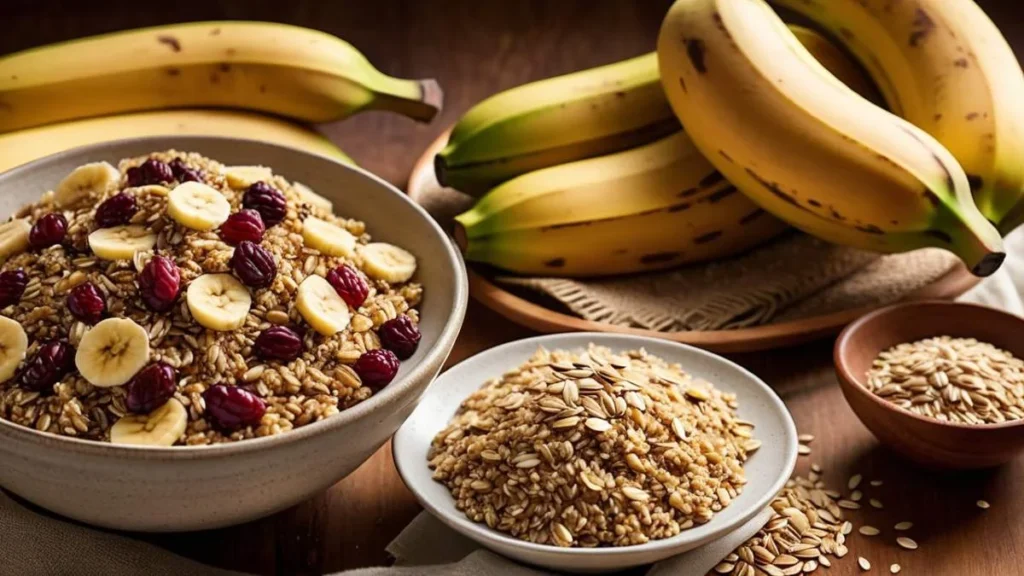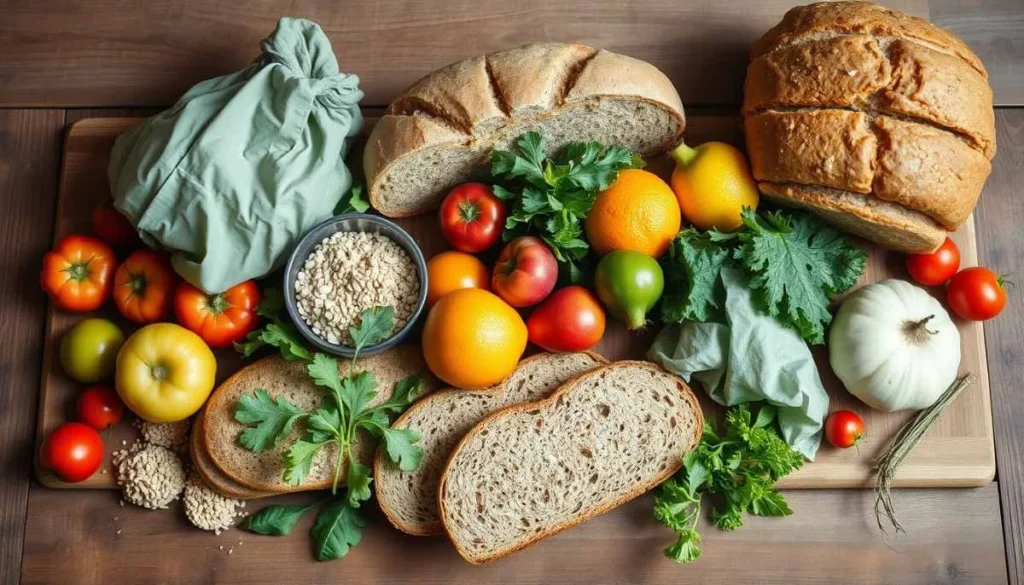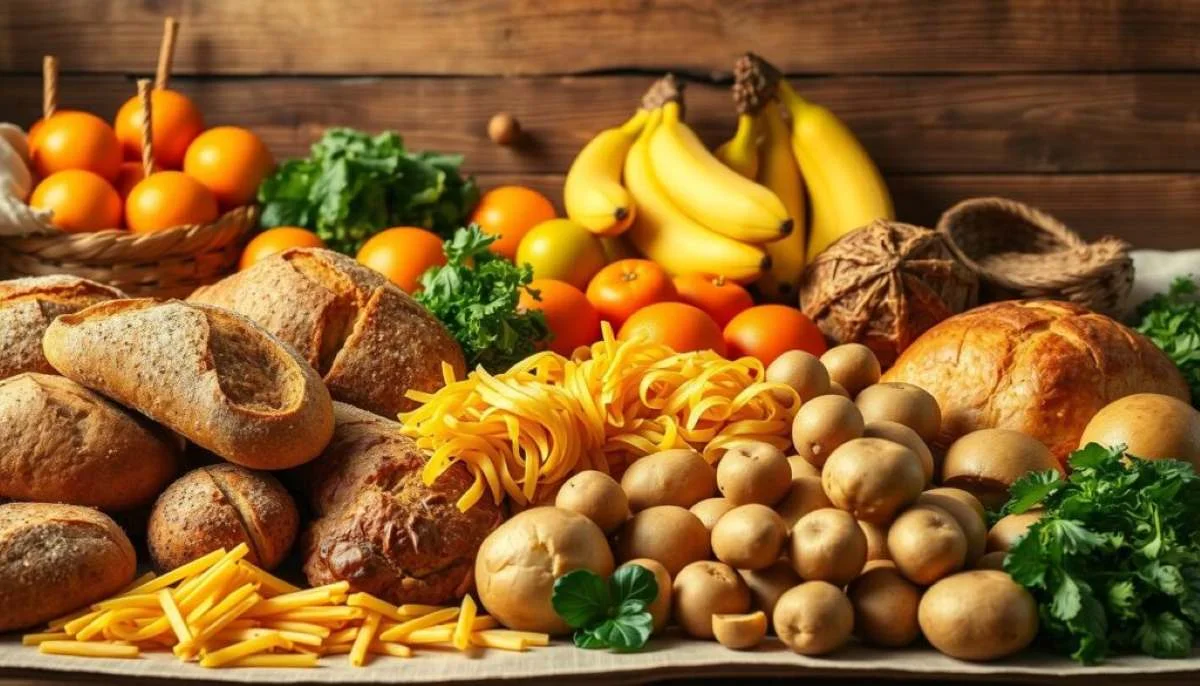High Carb Foods: Best Sources for Energy and Health
Table of Contents
High Carb Foods: Best Sources for Energy and Health
Carbohydrates are your body’s main fuel, giving you the energy you need every day. Knowing which high carb foods to eat can help you create a balanced diet. This supports your health and keeps you feeling good.
A diet rich in carbohydrates is key to powering your body. The FDA says carbs should make up 45% to 65% of your daily calories. This ensures you have enough energy for both your body and mind.
When you eat high carb foods, your body turns them into glucose. This glucose fuels your cells, tissues, and organs. Not all carbs are the same – some are better for you than others. Choosing wisely is important for staying healthy.
Your diet should include quality carbs that give you lasting energy and important nutrients. Whole grains, fruits, veggies, and legumes are better choices than processed carbs. They offer more nutritional value.
Understanding the role of high carb foods in your diet helps you make better choices. These choices support your health goals and keep your energy levels up all day.
Understanding Carbohydrates and Their Role in Health
Carbohydrates are key nutrients that power your body. They are the main energy source, fueling your brain and muscles. Knowing how carbs work helps you make better food choices for health.
Simple vs Complex Carbohydrates
Carbohydrates come in two types: simple and complex. Simple carbs, found in sugars and processed foods, are quickly absorbed. They can cause blood sugar spikes. On the other hand, complex carbs, like those in starchy vegetables and whole grains, give steady energy and nutrients.
- Simple carbs: Quick energy, rapid absorption
- Complex carbs: Slow, steady energy release
- Whole grains provide more nutritional value
Daily Recommended Carbohydrate Intake
The daily carb intake should be 45% to 65% of your total calories. For a 2,000-calorie diet, that’s 225-325 grams of carbs. You need at least 130 grams for basic energy.
How Carbohydrates Fuel Your Body
Carbohydrates turn into glucose, which your cells use for energy. Starchy vegetables and whole grains offer sustained energy and nutrients. Each gram of carbohydrate provides 4 calories, making them a good energy source.
Pro tip: Choose complex carbohydrates from whole food sources to maximize nutritional benefits and maintain steady energy levels.
Benefits and Functions of High Carb Foods
Carbohydrates are key for fueling your body and keeping you healthy. Eating bread and pasta gives your body the energy it needs. This energy helps you do daily tasks and keeps your body running smoothly.
High-carb foods do more than just give you energy. They also have many other benefits:
- Brain Function: Glucose from carbs is what the brain likes to use for energy
- Muscle Performance: Carbs help keep muscle glycogen levels up during hard activities
- Mood Regulation: Eating carbs regularly can help keep your mood stable
Not all carbs are the same. Whole grain bread and pasta are good for you. But, snacks with lots of sugar can cause your blood sugar to go up and down too fast.
| Carbohydrate Type | Energy Impact | Health Benefits |
|---|---|---|
| Complex Carbohydrates | Sustained Energy | Improved Digestion, Lower Cholesterol |
| Simple Carbohydrates | Quick Energy Burst | Limited Nutritional Value |
Your body turns carbs into glucose, which is vital for your cells, tissues, and muscles. Choosing carbs that are full of nutrients can greatly improve your health and energy.
Nutrition experts say to choose complex carbs for the best health and steady energy all day.
Best Sources of High Carb Foods for Optimal Energy
Fueling your body with the right carbs can boost your energy and health. Knowing the best high-carb foods helps you choose wisely. This supports your energy and performance.
Whole Grains and Cereals: Powerhouse of Nutrition
Whole grains are nutritional powerhouses. They have complex carbs that give energy slowly, avoiding energy drops. Here are some top whole grain choices:
- Quinoa (64.2g carbs per 100g)
- Oats (67g carbs per 100g)
- Couscous (72g carbs per 100g)
- Brown rice (76.2g carbs per 100g)
Starchy Vegetables: Natural Energy Boosters
Starchy vegetables are full of carbs, vitamins, and minerals. They help keep your energy up all day:
| Vegetable | Carbohydrates (per 100g) |
|---|---|
| Potatoes | 25g |
| Parsnips | 18g |
| Carrots | 10g |
Legumes and Beans: Fiber-Rich Energy Sources
Legumes and beans are great for sustained energy. They’re full of protein, complex carbs, and nutrients. Check out these legume options:
- Chickpeas (13g carbs, 7g fiber per 100g)
- Baked beans (15.5g carbs per 100g)
Choose fresh, unprocessed fruit juices to avoid too much sugar. Pair high-carb foods with lean proteins for better energy and stable blood sugar.

Pro tip: Balance your carbohydrate intake with your activity level to maximize energy and performance.
Fruits and Natural Sugar Sources
Fruits are a great natural source of carbs and essential nutrients. Unlike processed foods, fruits are full of vitamins, minerals, and natural sugars. These help keep you healthy.
Knowing what fruits offer can help you eat better. Like root vegetables, fruits give you complex carbs. These carbs give you energy that lasts, without the bad stuff in processed foods.
- Berries: Low in calories, high in antioxidants
- Bananas: Rich in potassium and quick energy
- Apples: High in fiber and vitamin C
- Oranges: Excellent source of immune-boosting nutrients
The American Heart Association says to limit added sugars and eat more natural fruits. Men should not have more than 9 teaspoons of added sugar a day. Women should limit it to 6 teaspoons.
| Fruit | Carbohydrates (g) | Fiber (g) |
|---|---|---|
| Apple | 25 | 4.4 |
| Banana | 27 | 3.1 |
| Orange | 18 | 3.1 |
Natural sugars like honey and maple syrup are better than refined sugars. They have more nutritional value than processed foods. This makes them a good choice for healthy carbs.
Choosing whole fruits over fruit juices maximizes nutritional intake and helps maintain steady blood sugar levels.
Only 12.3% of U.S. adults eat enough fruits, which is 1.5 to 2 cup-equivalents a day. Eating a variety of fruits can boost your nutrition and energy.
Smart Carbohydrate Choices for Athletes and Active Individuals
Athletes need the right nutrition to perform well and recover fast. A diet rich in carbohydrates is key for energy and performance. Knowing how to choose high carb foods can boost your athletic abilities.
Professional athletes stick to certain nutrition plans to fuel their bodies. The amount of carbs they need depends on how hard they train and their personal needs.
Pre-workout Carbohydrate Options
Choosing the right carbs before working out can greatly improve your performance. Here are some tips for pre-workout nutrition:
- Eat simple carbs 30-60 minutes before exercising
- Go for foods like bananas, oatmeal, or energy bars that are easy to digest
- Try to eat 30-50 grams of carbs to keep your energy up
Post-exercise Recovery Foods
It’s important to refill glycogen stores after hard workouts for muscle recovery. Your recovery meal should have carbs and protein in balance.
- Eat 30-90 grams of carbs within 30-60 minutes after working out
- Add lean proteins to help muscles repair
- Opt for foods like sweet potatoes, quinoa, or whole grain pasta that are full of nutrients
Timing Your Carb Intake
Timing your carb intake can help you perform better. Athletes should plan when to eat carbs to boost energy and aid in recovery.
- Carb-load 48-24 hours before long competitions
- Eat simple carbs 1-2 hours before strength events
- Stay hydrated with foods and drinks that have electrolytes
By using these carb strategies, you can improve your athletic performance and meet your body’s nutritional needs.
Balancing Carbohydrates in Your Diet

It’s important to balance carbohydrates for good health. Your body needs the right mix of starchy vegetables, grains, and cereals. This mix helps keep your energy up and your metabolism working well.
Not all carbs are the same. Knowing how to mix them can really help your health.
Here are some tips for managing carbs:
- Choose high-quality, fiber-rich carbohydrates that support steady blood sugar levels
- Incorporate a variety of whole grains and cereals into your diet
- Balance carbohydrates with lean proteins and healthy fats
- Practice portion control, especially with starchy vegetables
Women should aim for 25 grams of fiber daily, while men need about 38 grams. Whole grains and starchy veggies give you lasting energy. They also help keep your blood sugar stable and improve insulin use.
Your carb needs change based on your age, how active you are, and your health goals. Nutrition experts say to choose unrefined whole grains like quinoa, brown rice, and oats. They’re better for you than refined carbs.
Metabolic flexibility is key to effectively using carbohydrates for energy and maintaining overall health.
By carefully picking and balancing your carbs, you can meet your body’s needs. You’ll also enjoy tasty, energy-boosting foods.
Common Misconceptions About High Carb Foods
Carbohydrates have been wrongly blamed in recent debates. Knowing the truth about bread and pasta helps you make better food choices. These choices support your health and energy.
Many think all carbs are bad. But, the truth is more complex. The quality of carbs you eat greatly affects your nutrition.
Debunking Carb Myths
- Myth: All carbs cause weight gain
Fact: Weight gain comes from eating more calories than you burn, not just carbs.
- Myth: Carbohydrates are nutritionally empty
Fact: Whole grains, legumes, and fruits are full of nutrients and fiber.
- Myth: Sugar-laden snacks are equivalent to healthy carbohydrates
Fact: Healthy carbs are different from sugary foods that offer little nutrition.
Quality vs Quantity of Carbohydrates
What carbs you choose is more important than how much you eat. Whole grain bread and pasta are better than sugary snacks.
| Carbohydrate Type | Nutritional Value | Health Impact |
|---|---|---|
| Whole Grains | High Fiber, Minerals | Supports Digestive Health |
| Legumes | Protein, Complex Carbs | Steady Energy Release |
| Sugar-Laden Snacks | Low Nutrients | Potential Blood Sugar Spikes |
The Dietary Guidelines suggest 45-65% of daily calories should come from carbs. Choose complex carbs for lasting energy and nutrients.
Making Healthy High-Carb Food Choices
Finding the right carbs can be tough, but it’s key for your health. Look for quality and nutrition, not just calories.
Here are some tips for picking good carbs:
- Prioritize whole grains with whole wheat flour as the first ingredient
- Select minimally processed carbohydrate sources
- Balance fruit juices with whole fruits for better fiber intake
- Explore diverse grain options like quinoa, farro, and millet
Legumes and beans are super nutritious. They have complex carbs, fiber, and important nutrients like iron and folate. Add them to your meals often.
| Carbohydrate Source | Nutritional Benefits | Serving Recommendation |
|---|---|---|
| Sweet Potatoes | Complex carbs, fiber, sustained energy | 1/2 cup per serving |
| Quinoa | Complete protein, all essential amino acids | 1/4 cup dry |
| Black Beans | High fiber, plant-based protein | 1/2 cup cooked |
Be careful with fruit juices because of their sugar. It takes about three oranges to produce one cup of orange juice. This can mean too much sugar without the fiber of whole fruits.
Your carb choices should give you energy and nutrients. Go for variety, whole foods, and the right amounts for best health.
Reach more ideas bellow:
Conclusion
Knowing about high carb foods is key to a balanced diet. Root vegetables and whole grains are good sources of carbs. They help keep your energy up and support your health.
When picking carbs, choose quality over quantity. Go for foods rich in nutrients like vitamins and minerals. This way, you get the most out of your carbs.
Focus on complex carbs like sweet potatoes, quinoa, and legumes. They give you energy that lasts and don’t cause blood sugar spikes. Adding these to your diet helps you meet your health goals and get the nutrients you need.
Your carb plan should fit your personal needs. The daily carb intake varies, but listen to your body. Notice how different carbs affect you and adjust your diet to feel your best.
Not all carbs are the same. Avoid sugary drinks and white bread. Choose whole grains, root veggies, and natural carbs for lasting nutrition and better health.
You can know about energy bar on this link.
FAQ
What are high-carb foods?
High-carb foods are rich in carbs. They include whole grains, starchy veggies, fruits, legumes, and cereals. These foods give your body energy and help with many bodily functions.
Are all carbohydrates bad for you?
No, not all carbs are bad. Complex carbs, found in whole foods, offer energy and nutrients. Simple carbs, like sugar, can raise blood sugar quickly.
How many carbohydrates should I consume daily?
Daily carb intake depends on your age, sex, and activity level. Carbs should make up 45-65% of your calories. For most adults, that’s 225-325 grams a day.
What are the best sources of complex carbohydrates?
Best complex carbs come from whole grains, starchy veggies, legumes, and whole fruits. They give lasting energy and are full of fiber and nutrients.
Can high-carb foods help with athletic performance?
Yes, carbs are key for athletes. They provide quick energy and help muscles recover. Eating carbs before, during, and after exercise boosts performance and recovery.
How do carbohydrates affect blood sugar?
Carbs affect blood sugar differently. Simple carbs raise it quickly, while complex carbs release energy slowly. Knowing the glycemic index helps manage blood sugar.
Are fruit juices a good source of carbohydrates?
Fruit juices have carbs but lack fiber and can have added sugars. Whole fruits are better, offering more nutrients and stable blood sugar.
How can I make healthier carbohydrate choices?
Choose whole, unprocessed foods for better carbs. Opt for whole grain bread, sweet potatoes, and fresh fruits. Balance carbs with proteins and healthy fats for best nutrition.
Can high-carb foods help with weight management?
Yes, if chosen wisely, high-carb foods aid in weight management. Foods high in fiber keep you full and provide energy. Portion control and nutrient-dense carbs are key.
What are the signs of carbohydrate deficiency?
Signs of carb deficiency include fatigue, trouble concentrating, mood swings, weakness, and poor physical performance. Carbs are vital for brain function, energy, and health.

